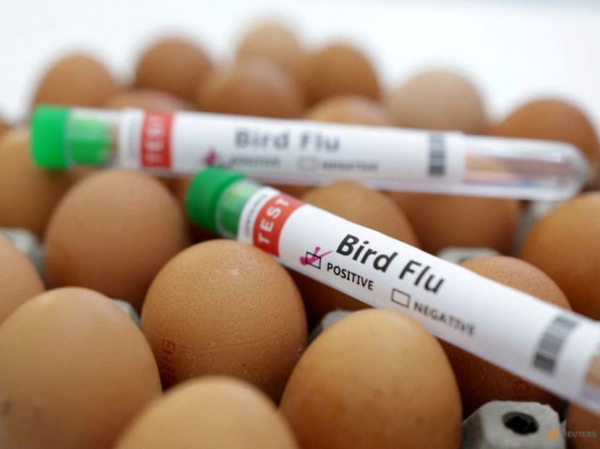Unraveling the Concerns: Assessing the Expanding Reach of H5N1 Bird Flu and its Potential Impact on Singapore

Navigating the Growing Concerns: H5N1 Bird Flu's Global Expansion and Singapore's Preparedness
Amid global health alerts, the World Health Organization (WHO) recently underscored the alarming spread of the H5N1 bird flu virus, expressing apprehension at its widening reach across various species, including humans, with a noted high mortality rate. The WHO highlighted the detection of the avian influenza A strain in raw milk from infected animals, raising questions about its survivability in dairy products. Initially identified in birds in 1996, H5N1 primarily posed a threat to avian populations, both wild and domestic. However, since 2020, the incidence of outbreaks among birds has surged, accompanied by a concerning uptick in infections among mammals.
The proximity of the virus to mammalian hosts prompted WHO's chief scientist, Jeremy Farrar, to issue warnings. Although human infections typically stem from contact with infected birds and livestock, there is presently no evidence suggesting human-to-human transmission. Nonetheless, Farrar emphasized the exceptionally high mortality rate associated with human infections, citing WHO records documenting 463 fatalities out of 889 reported cases across 23 nations from the beginning of 2023 to April 1 of the current year, equating to a 52% case fatality rate.
Expressing apprehension, Farrar cautioned that the virus's interaction with mammalian species brings it dangerously close to humans, raising concerns about potential mutations facilitating human-to-human transmission. Urging vigilance, he stressed the importance of swift access to vaccines, therapeutics, and diagnostics in the event of such an evolution.
As of now, Singapore remains untouched by the H5N1 bird flu. Dr. Paul Tambyah, president of the International Society for Infectious Diseases, conveyed measured reassurance regarding the current strain's risk, citing historical precedents of natural spillover events with more lethal strains in the past.
In this context, it becomes imperative to scrutinize the global landscape of the bird flu outbreak while assessing Singapore's resilience against potential incursions. Understanding the gravity of the situation, proactive measures and preparedness efforts are vital to preempt and mitigate any potential threats to public health.
Safeguarding Against Endemic Threats: Singapore's Vigilance Against Avian Influenza
Dr. Tambyah highlights the enduring endemic status of avian influenza in the region, underscored by the relatively low incidence of human cases. Singapore's resilience against highly pathogenic avian influenza strains can be attributed primarily to stringent biosecurity measures and robust surveillance protocols. Moreover, comprehensive animal vaccination initiatives across regional borders and effective biosecurity strategies have contributed to minimizing infections in domestic bird populations and preventing the contamination of domestic flocks by infected wild birds.
Dr. Tambyah acknowledges the fortuitous circumstance shared by Singapore and Malaysia, noting the limited transmissibility of H5N1 outside the controlled environments of factory farms. However, he cautions against complacency, suggesting that the virus's transmissibility could potentially escalate if scientists deliberately enhance its capabilities to expedite vaccine and treatment development. The controversial modification of bird flu viruses, as reported by Science Magazine in 2019, underscores the dual nature of such research—while it provides insights into virus transmission dynamics, it also poses risks of pathogen escalation and potential pandemic emergence.
Despite assurances of enhanced lab safety protocols, concerns persist regarding the inadvertent release or intentional misuse of modified viruses. Dr. Tambyah remains cautiously optimistic, citing reinforced safety measures and surveillance protocols within research laboratories. However, he stresses the need for ongoing vigilance and adherence to stringent safety protocols to mitigate the risk of accidental or deliberate dissemination.
Assessing the potential impact of an outbreak on Singapore, Dr. Tambyah emphasizes the nation's diversified food supply as a mitigating factor against disruptions in beef or chicken imports from major suppliers. According to the Singapore Food Agency's Singapore Food Statistics 2022 report, Singapore maintains import channels for poultry, processed eggs, and shell eggs from a diverse range of countries, ensuring food security resilience in the face of global health threats.
In light of evolving challenges posed by avian influenza, Singapore remains steadfast in its commitment to proactive measures and collaborative efforts aimed at safeguarding public health and ensuring food security resilience in the face of emerging infectious diseases.
Strengthening Regional Collaborations: Singapore's Multi-Faceted Approach to Infectious Disease Preparedness
Dr. Tambyah underscores Singapore's robust collaborations with neighboring countries as a pivotal aspect of their defense against infectious diseases, including but not limited to bird flu. These partnerships facilitate resource-sharing initiatives aimed at safeguarding public health across borders. Despite these collaborative efforts, Dr. Tambyah emphasizes the necessity of continued vigilance and proactive measures to mitigate the risk of infections.
On a national scale, Dr. Tambyah stresses the importance of sustained support for biosurveillance efforts conducted by various agencies, including the Singapore Food Agency (SFA), the National Environment Agency, and the Animal & Veterinary Service. Notably, Singapore's prompt response to outbreaks is exemplified by the suspension of raw poultry imports from regions affected by highly pathogenic H5N1 avian influenza outbreaks in December of the previous year.
In alignment with national efforts, the Mandai Wildlife Group, overseeing prominent wildlife parks in Singapore, collaborates closely with the Agri-Food and Veterinary Authority to implement stringent biosecurity measures. These measures include comprehensive bird vaccination programs and regular flu vaccinations for staff, coupled with rigorous daily health monitoring protocols. To date, there have been no reported cases of bird flu within the parks or the country.
At the individual level, Dr. Tambyah advocates for prudent behavior among Singaporeans, emphasizing the importance of avoiding contact with sick birds or animals. Additionally, he underscores the significance of practicing proper hand hygiene, particularly when interacting with animals at petting zoos or farmstays. Prompt medical attention is advised for individuals exhibiting symptoms of illness, further reinforcing Singapore's commitment to proactive health management at both national and individual levels.
In conclusion, Singapore's proactive approach to infectious disease preparedness, encompassing regional collaborations, stringent biosurveillance measures, and individual-level precautions, underscores its commitment to safeguarding public health. By leveraging strong partnerships with neighboring countries and implementing robust surveillance systems, Singapore remains resilient against emerging threats such as bird flu. The proactive measures undertaken by national agencies and organizations like the Mandai Wildlife Group exemplify Singapore's readiness to respond swiftly to potential outbreaks. Through collective efforts and individual responsibility, Singapore continues to fortify its defenses against infectious diseases, ensuring the well-being of its populace and maintaining its status as a global leader in public health resilience.


